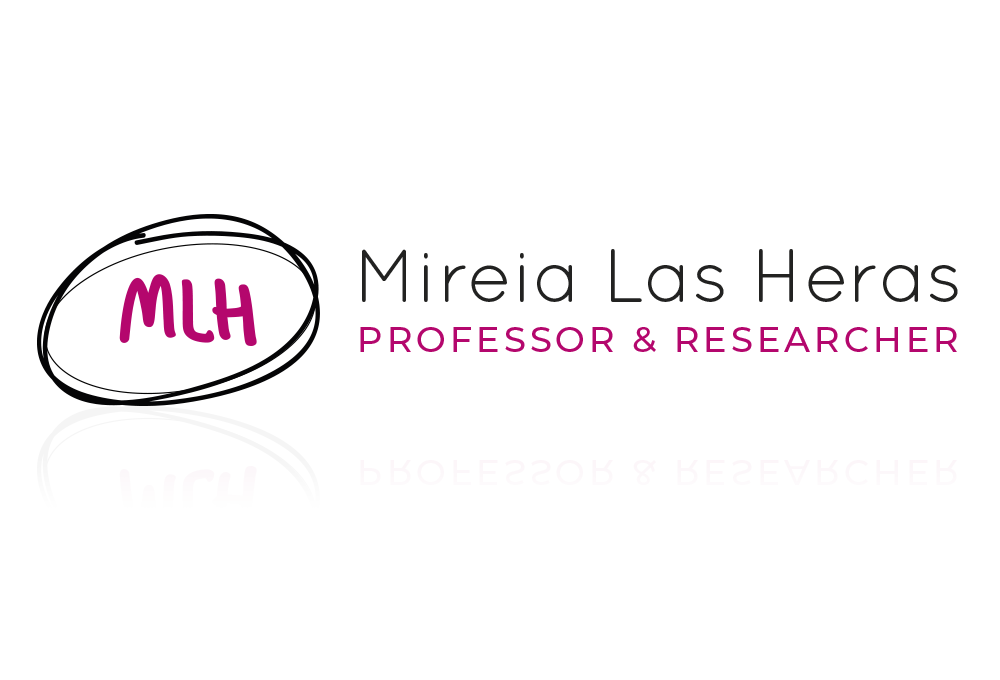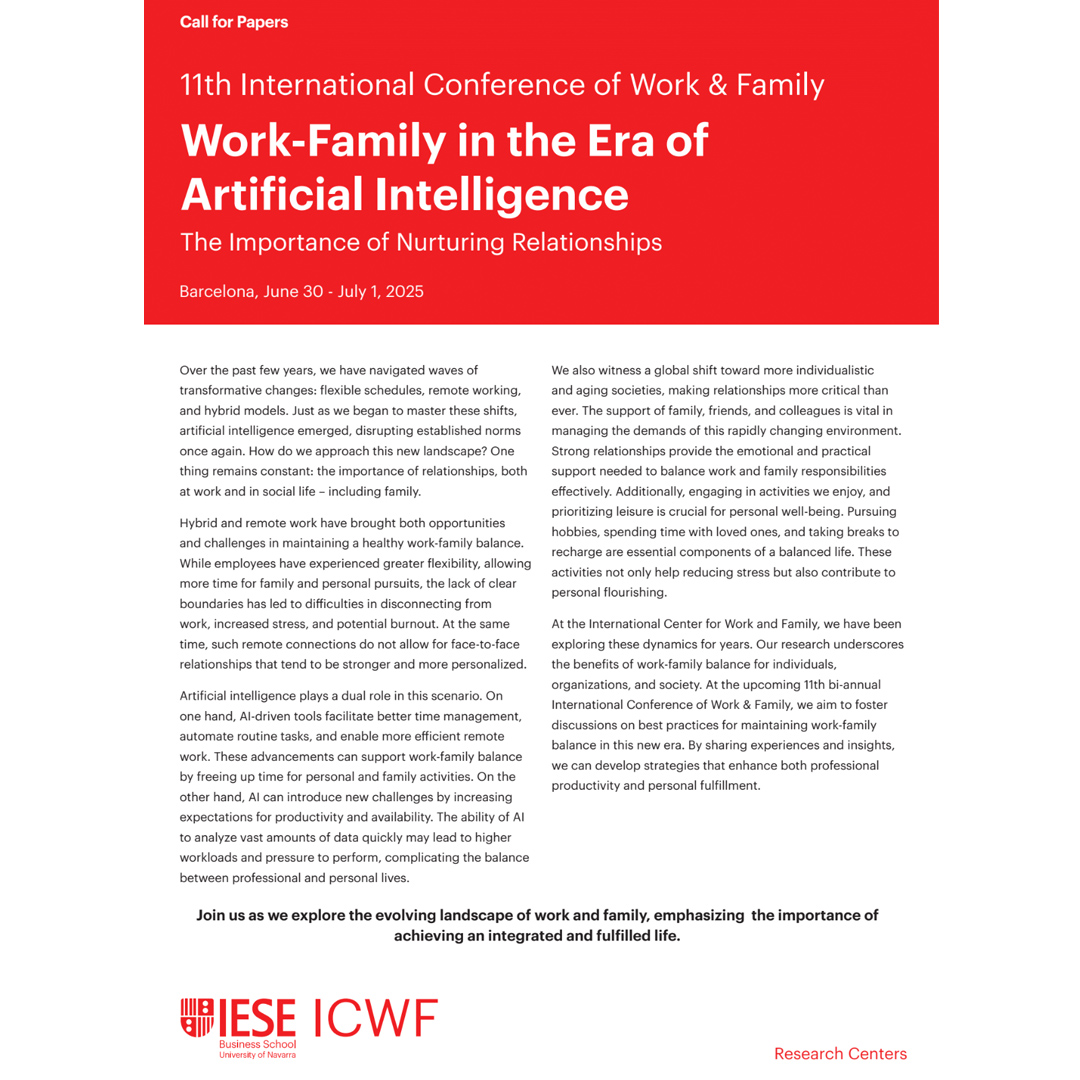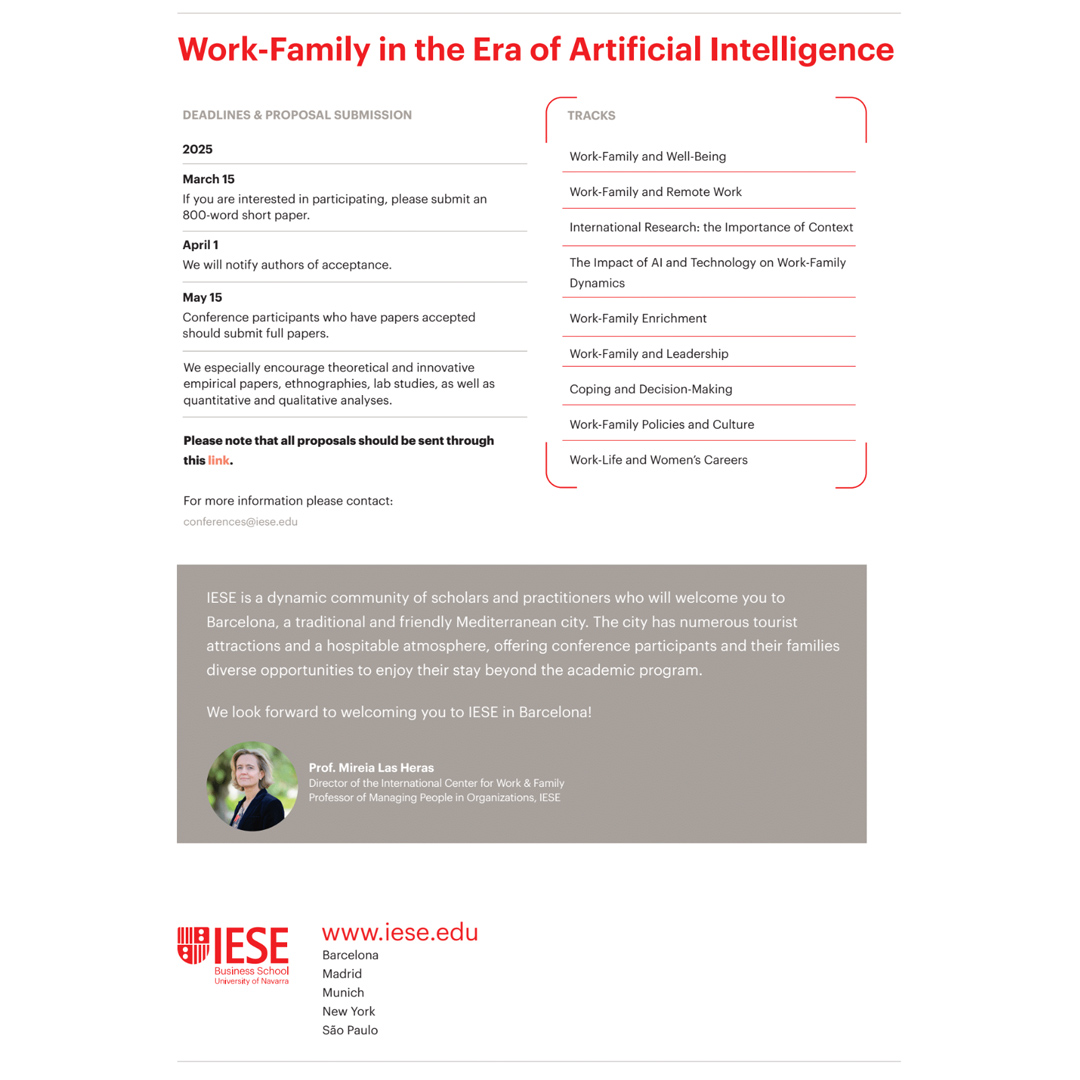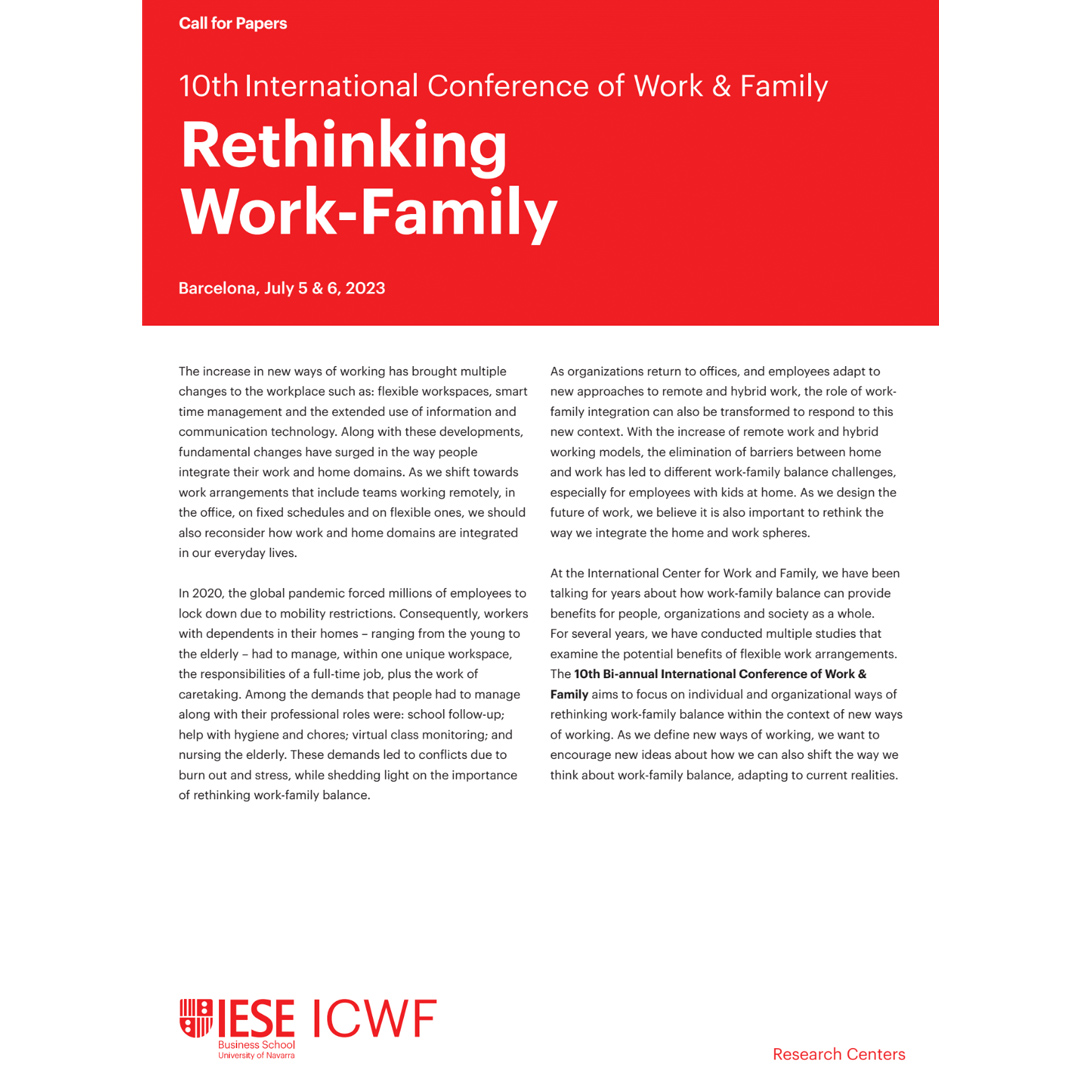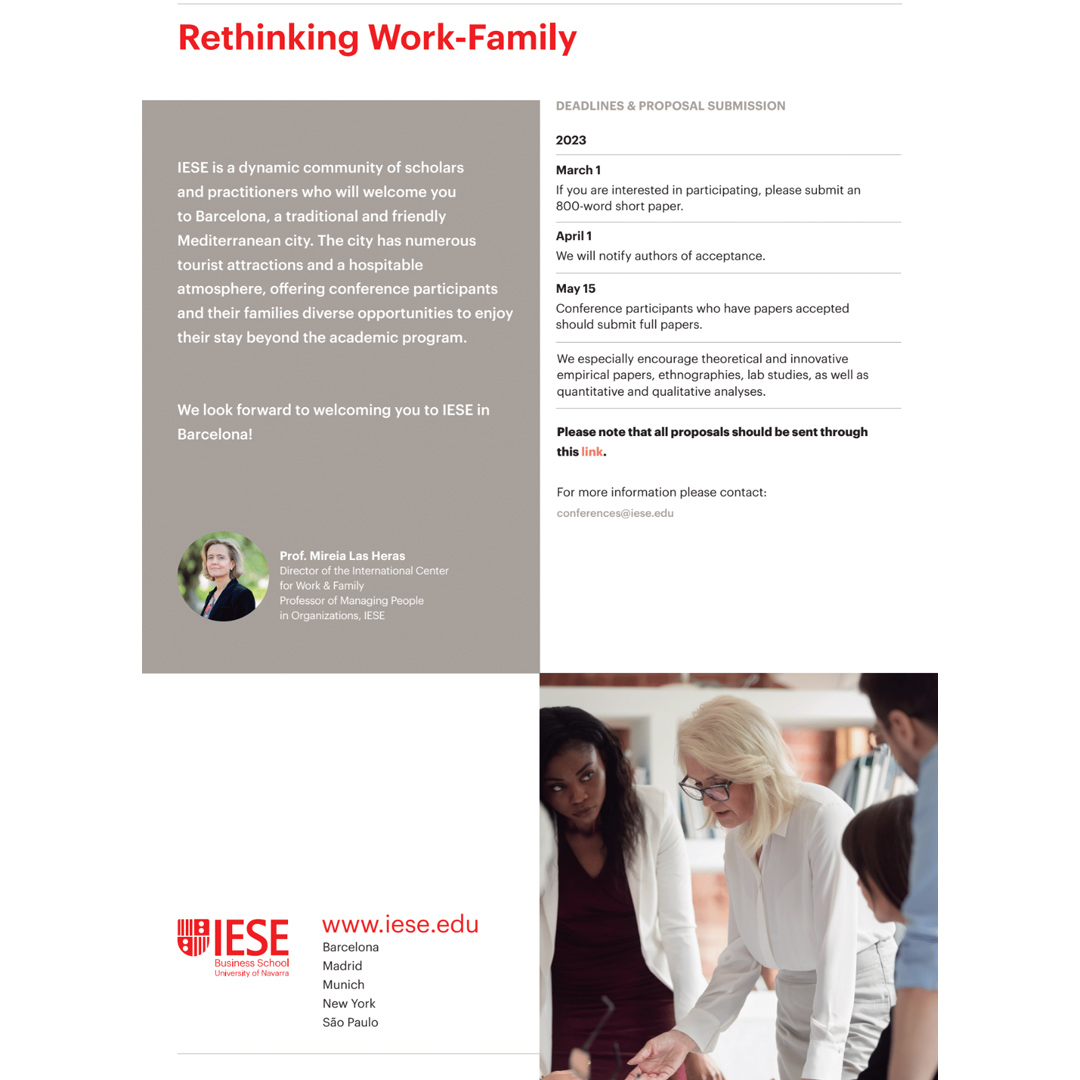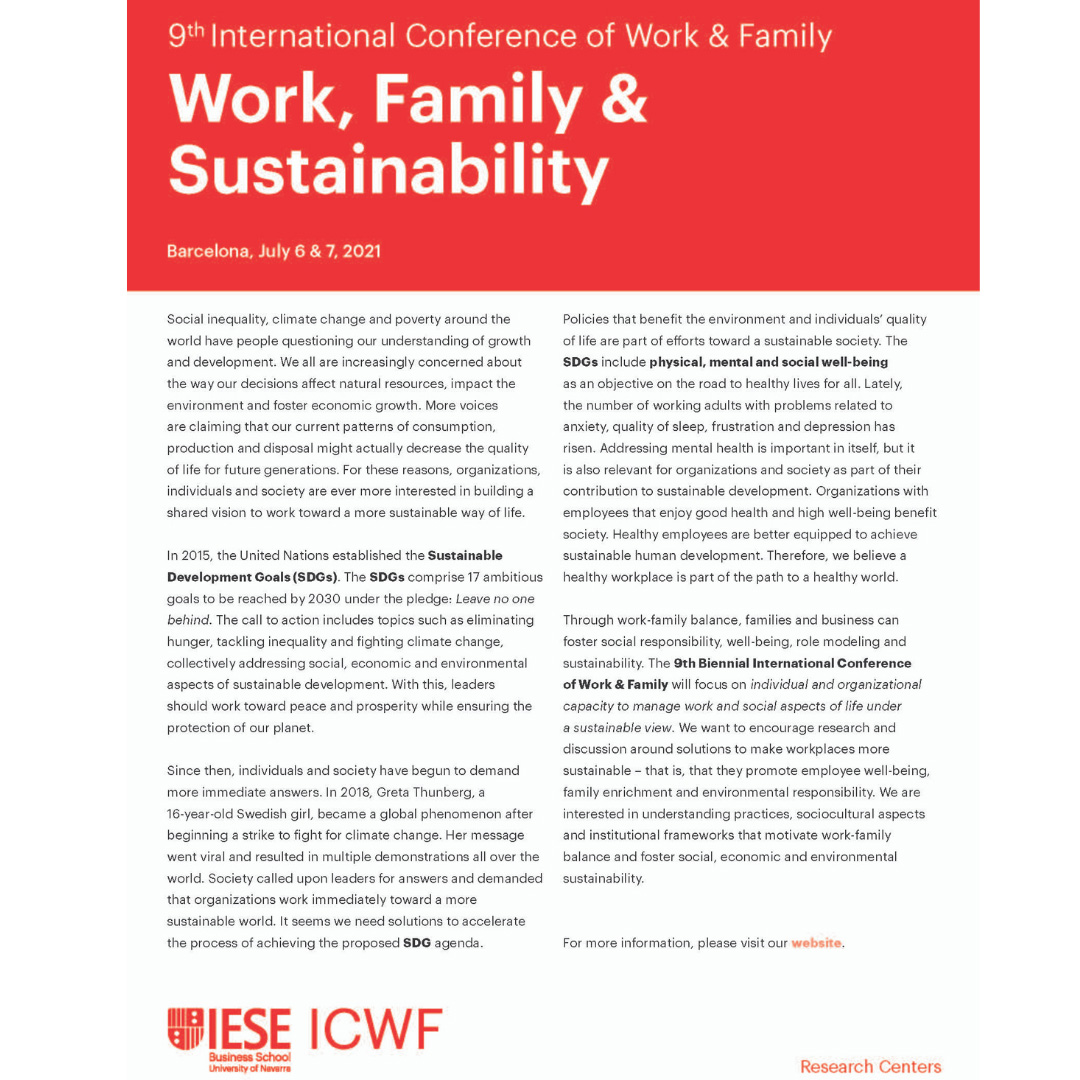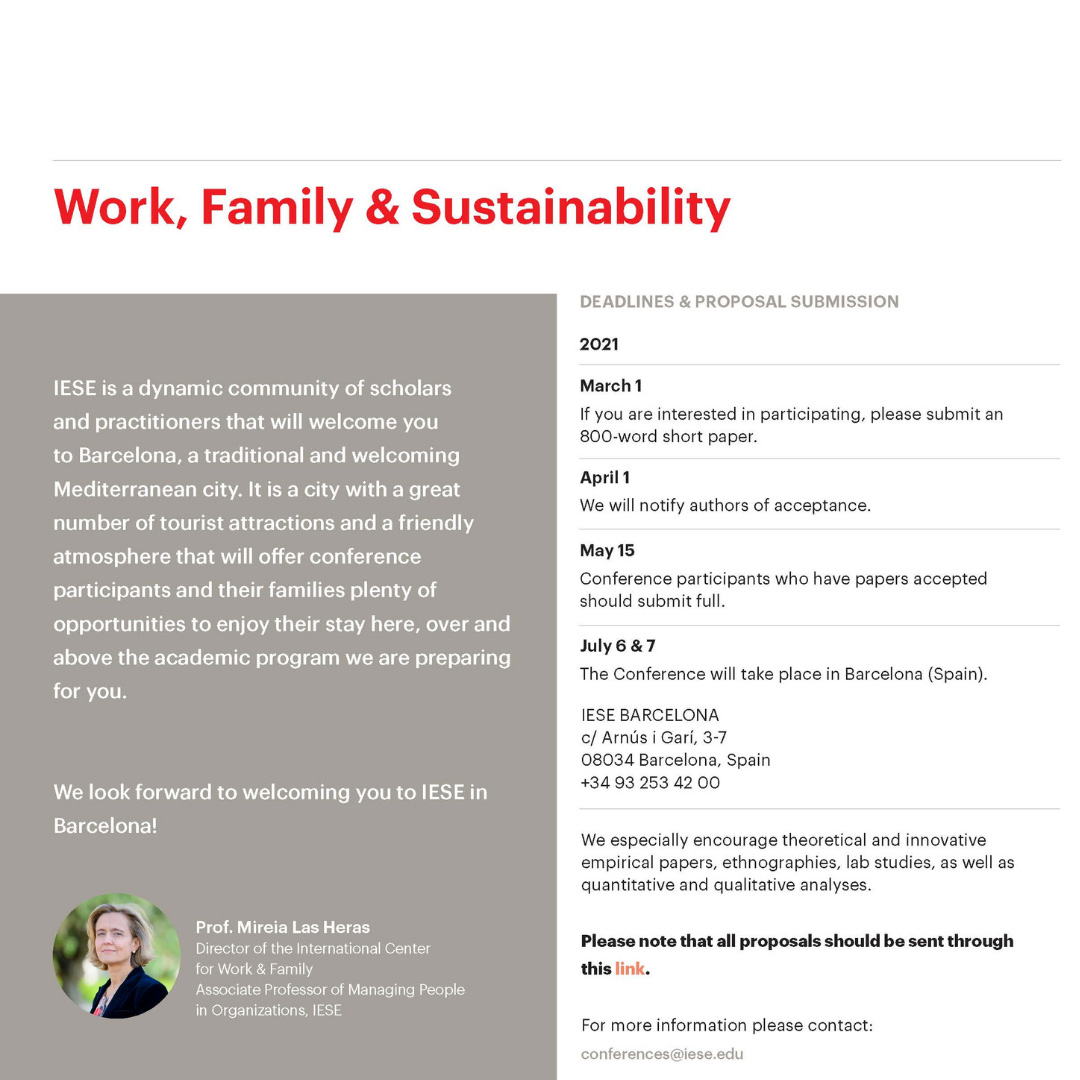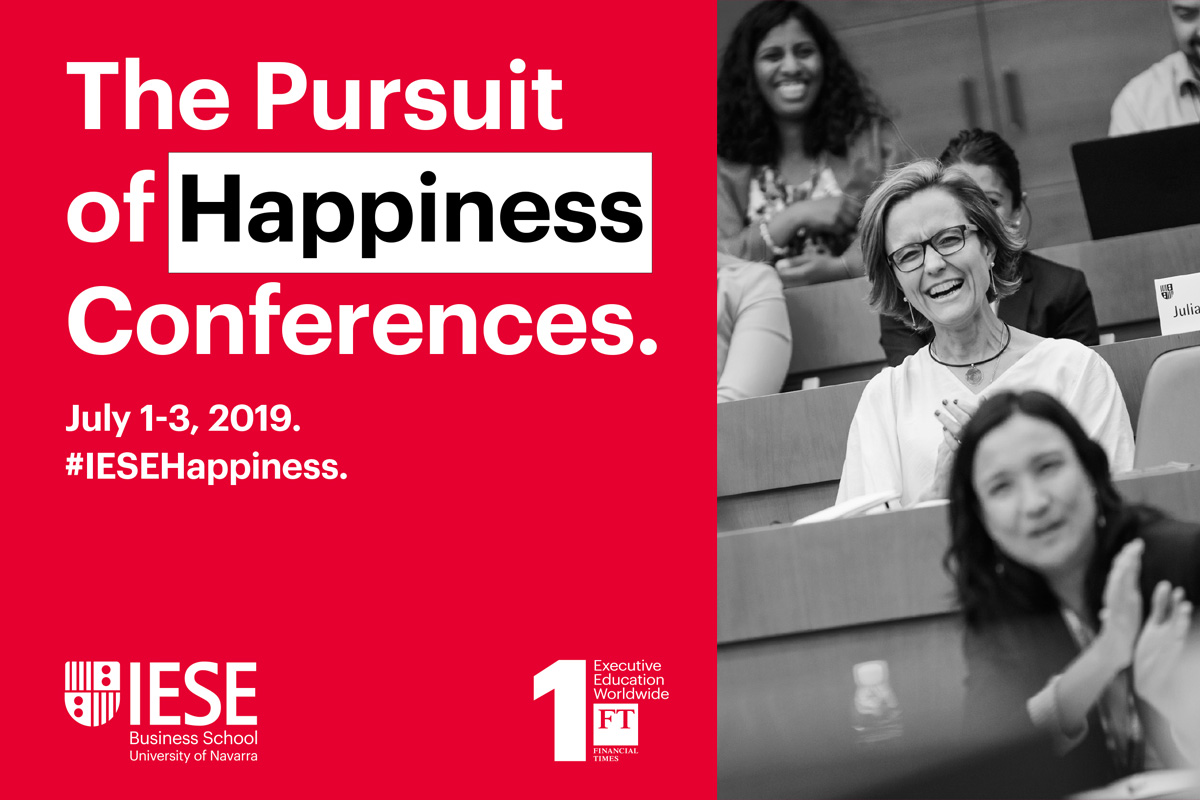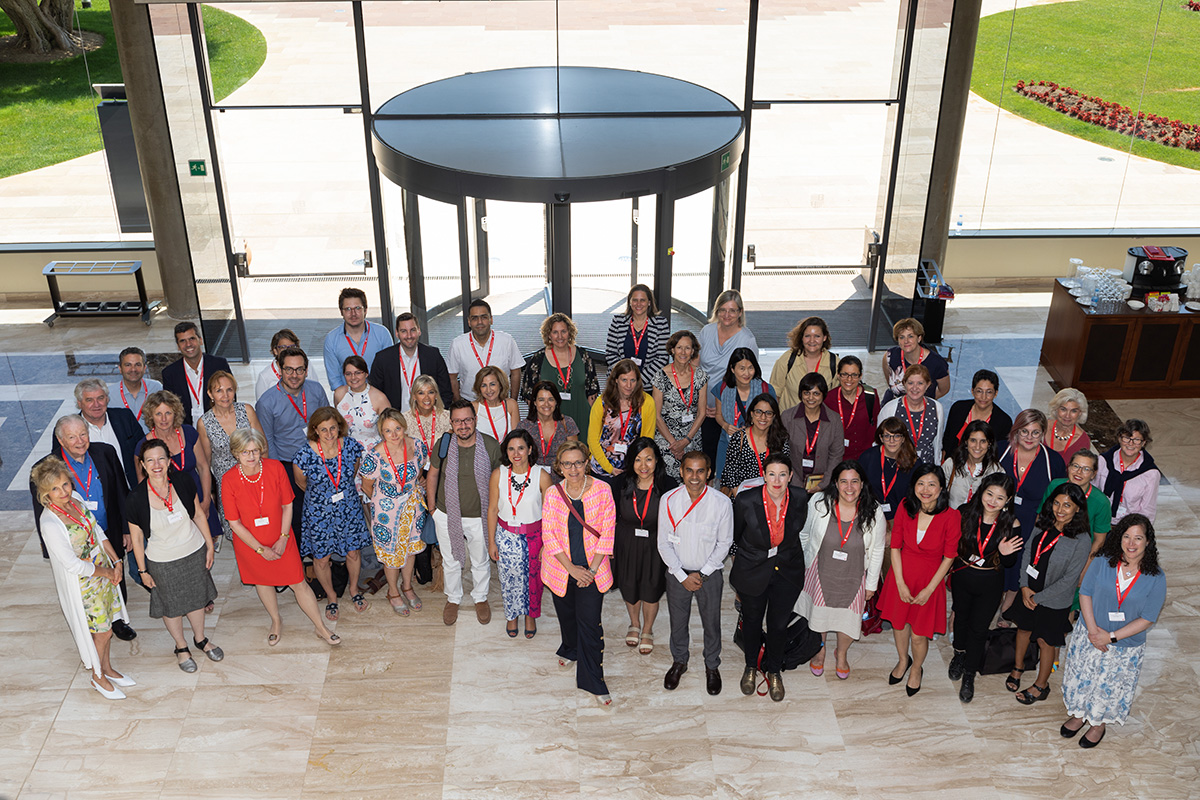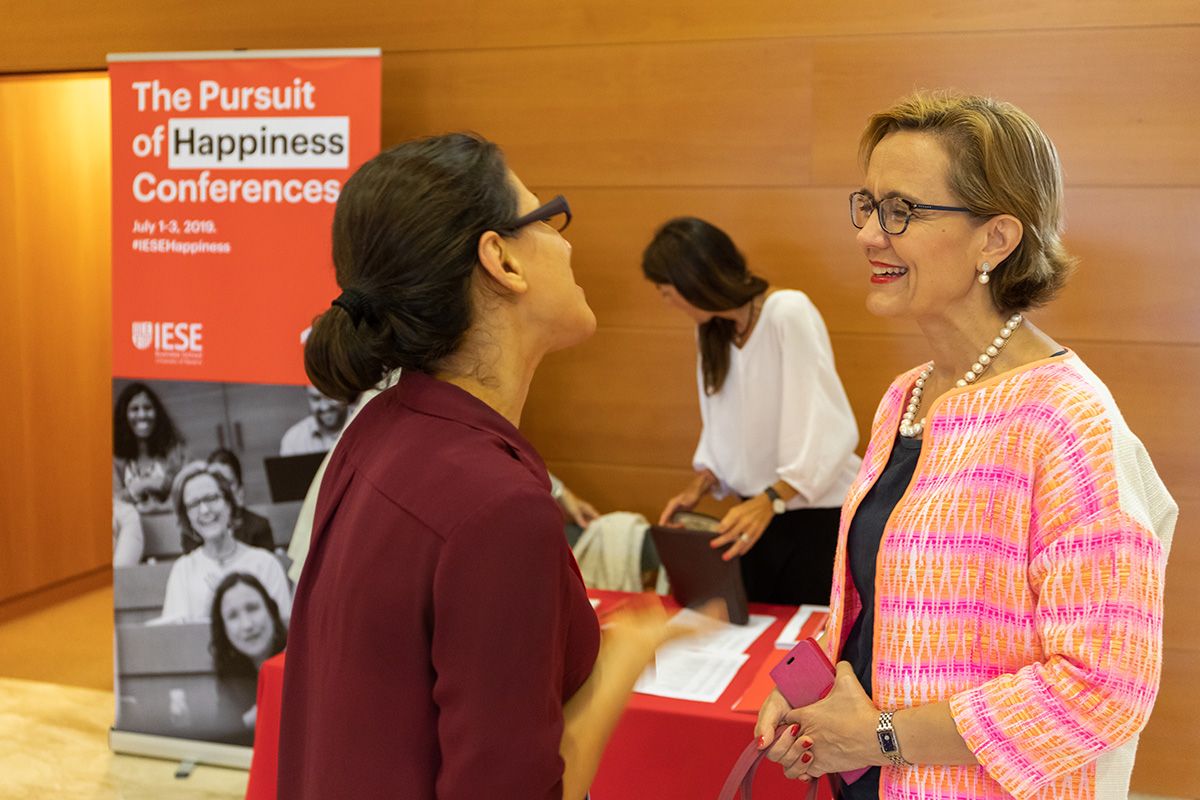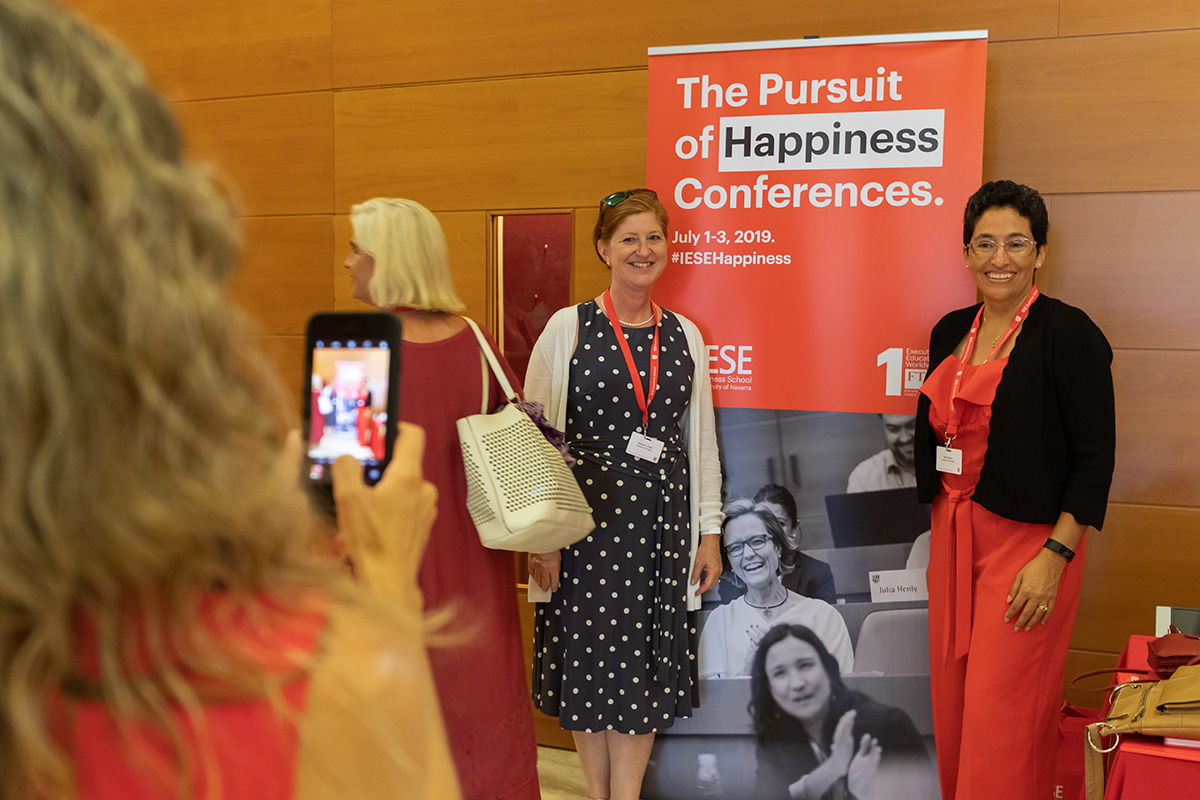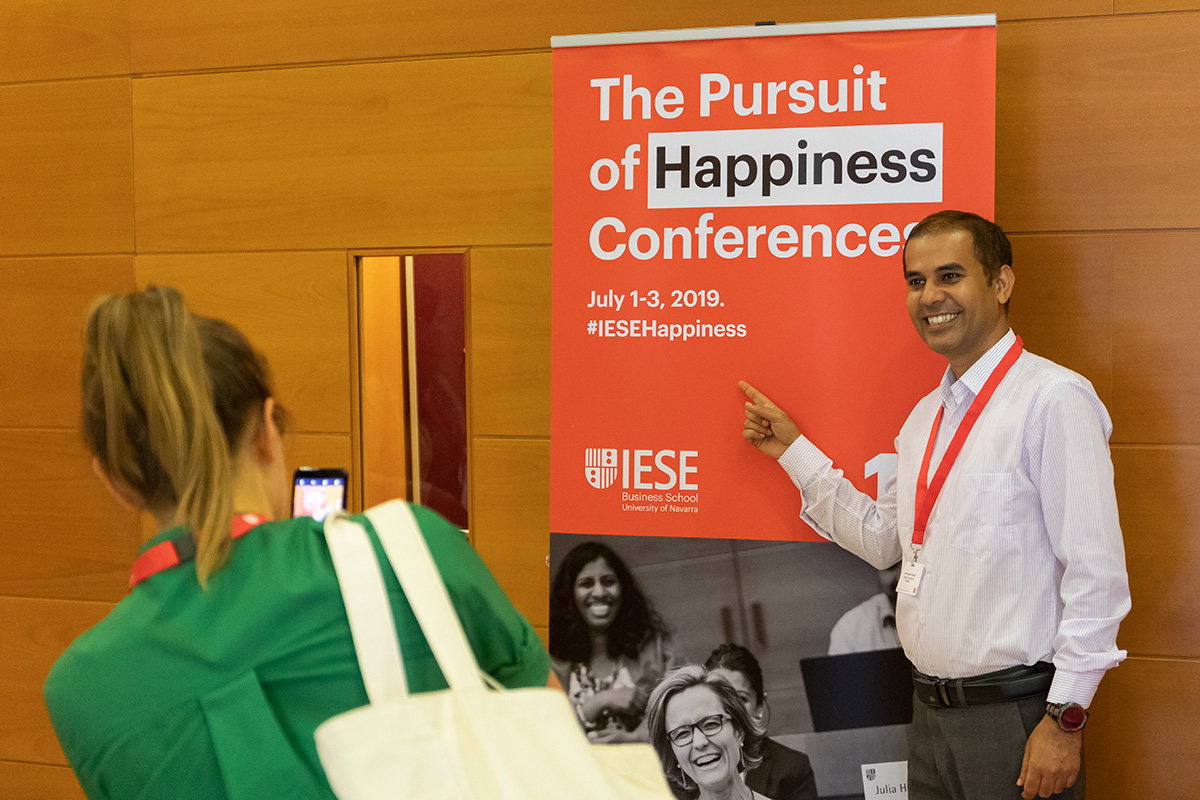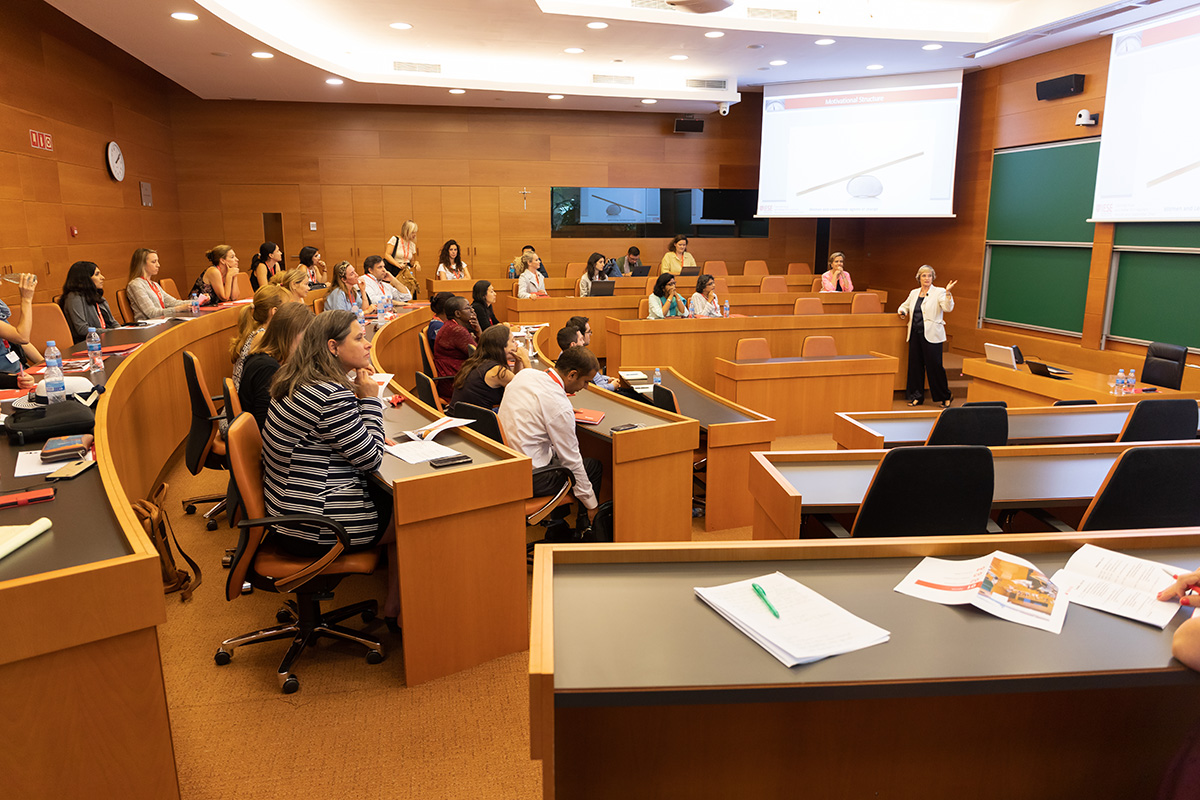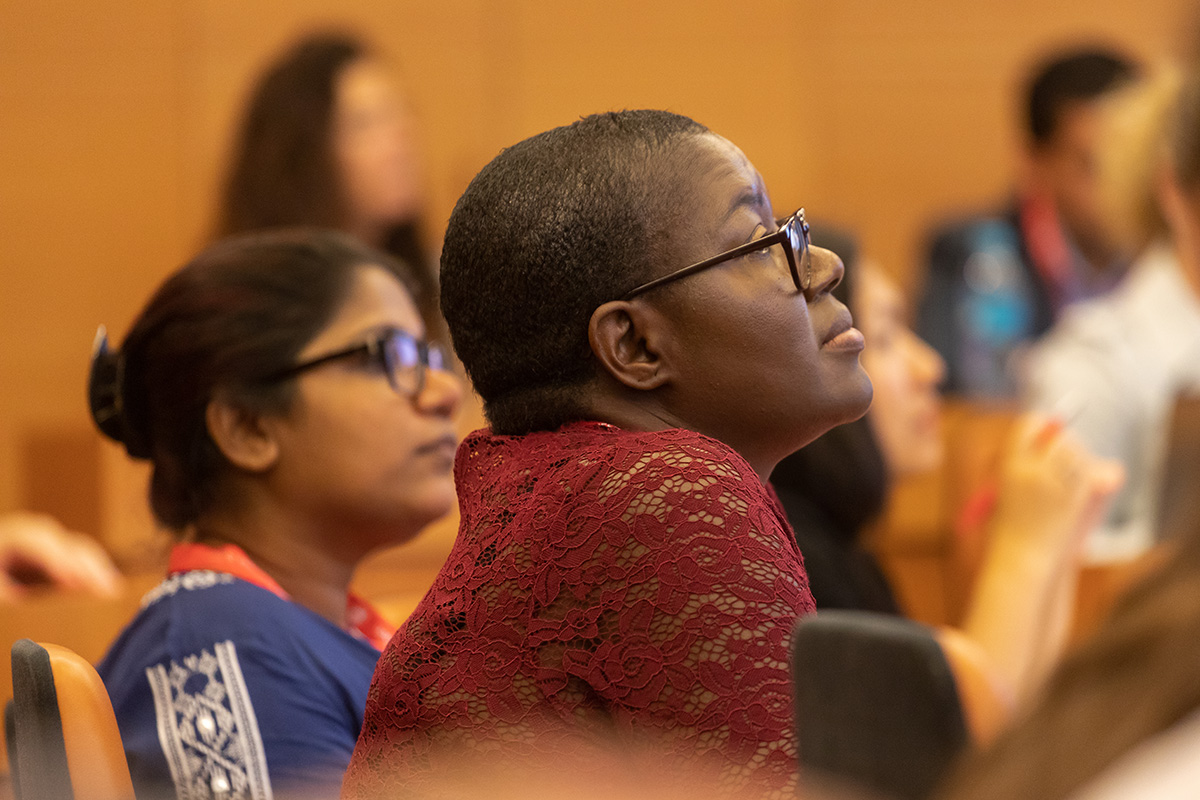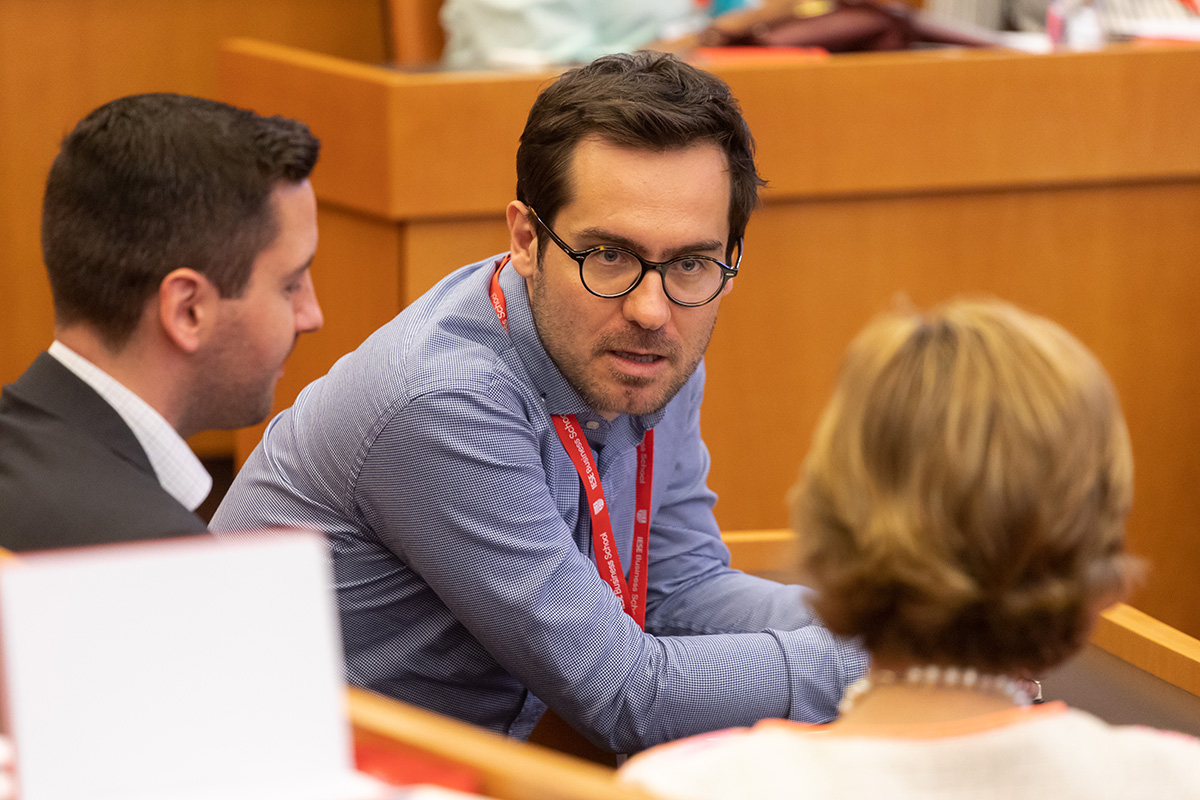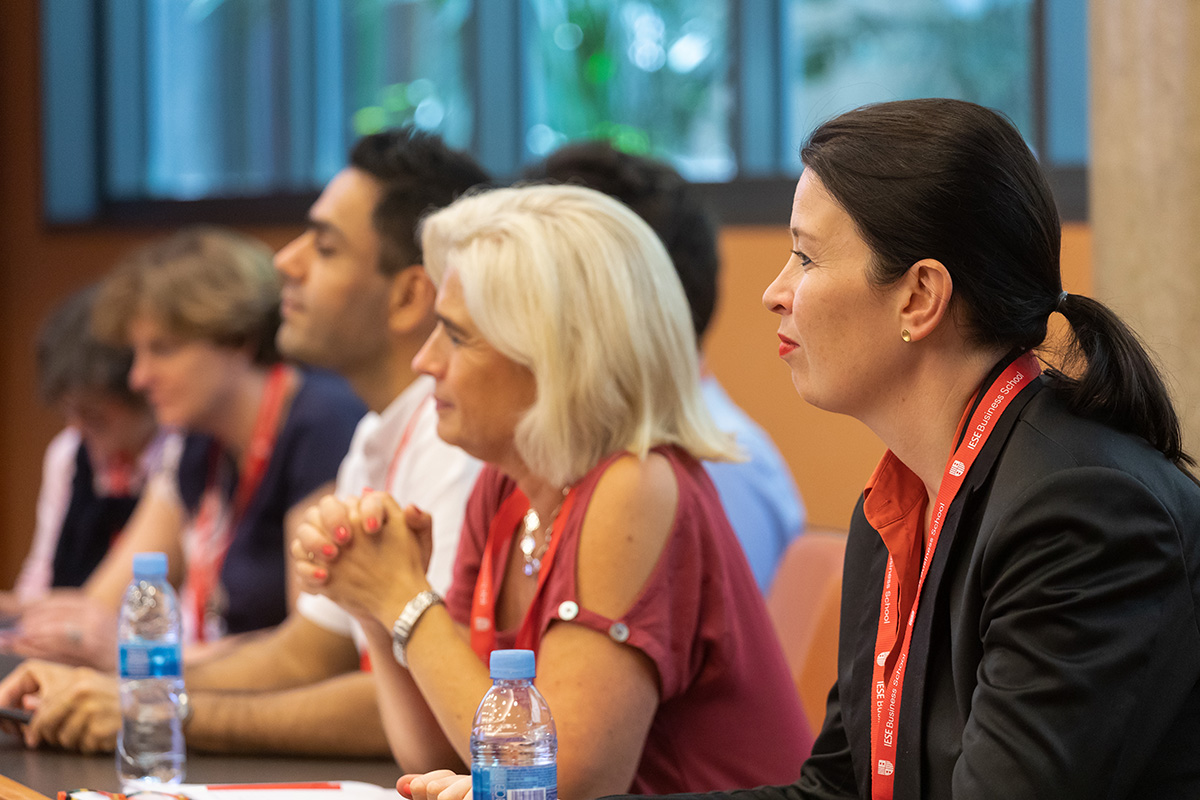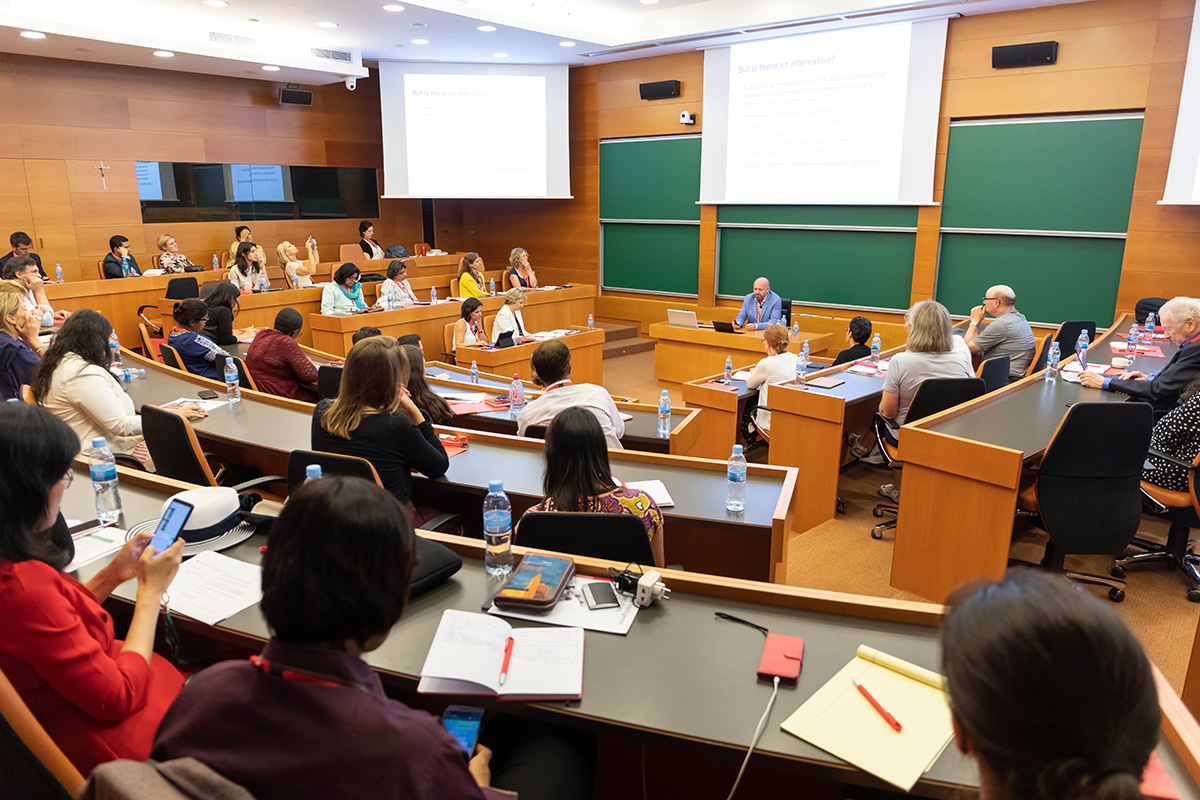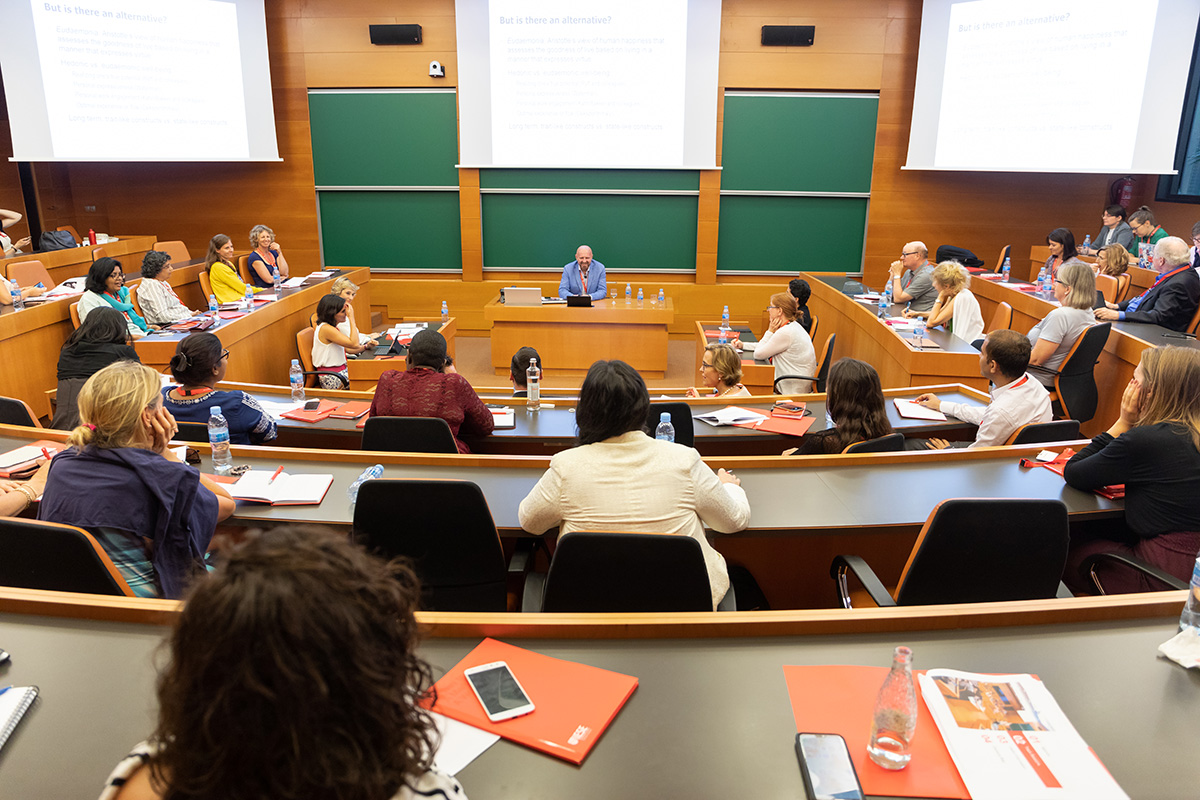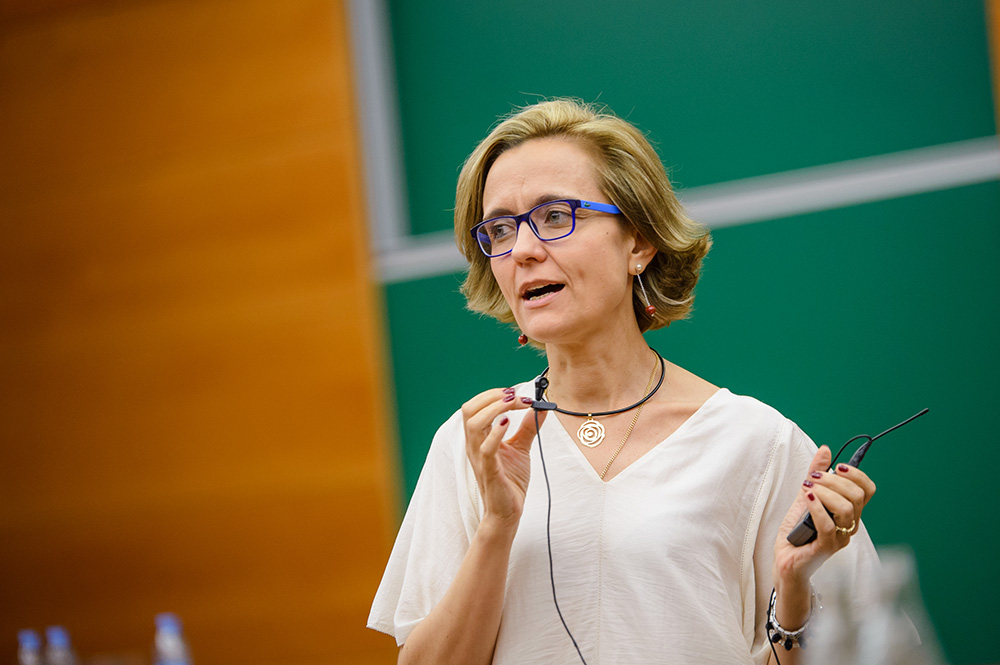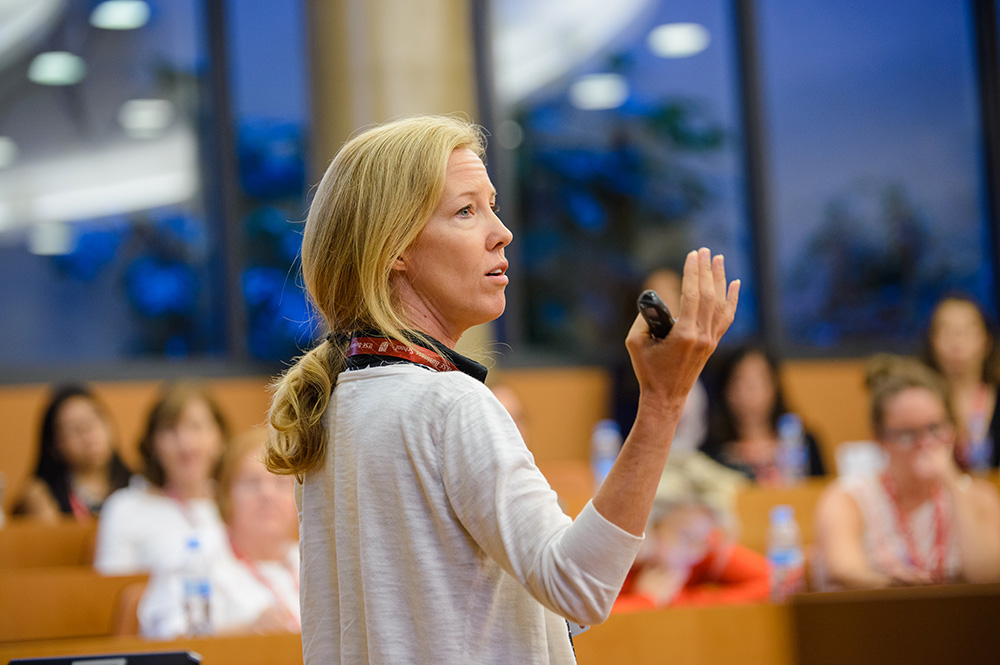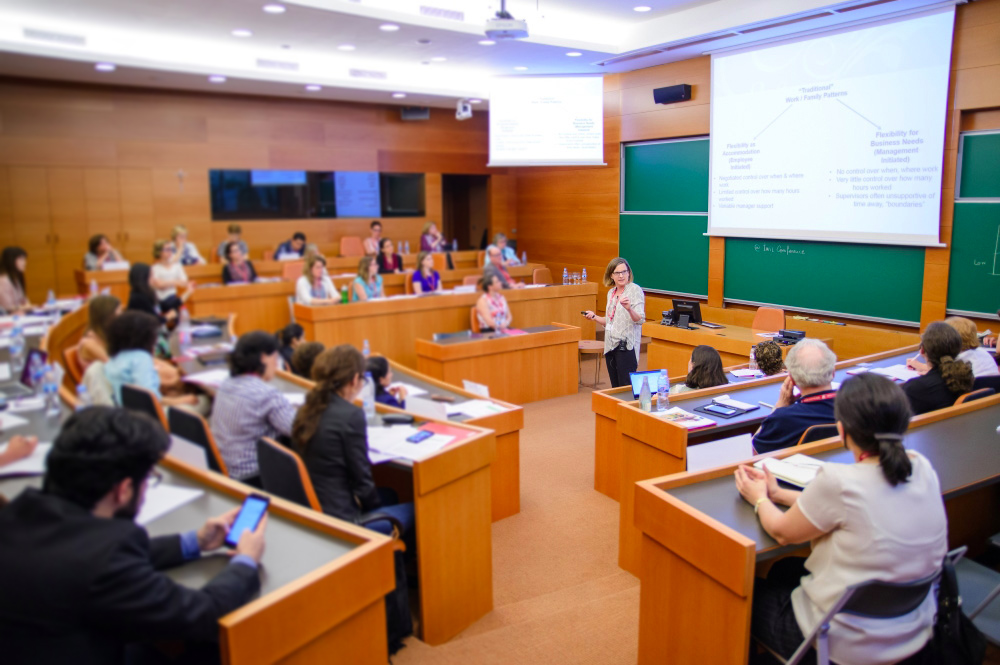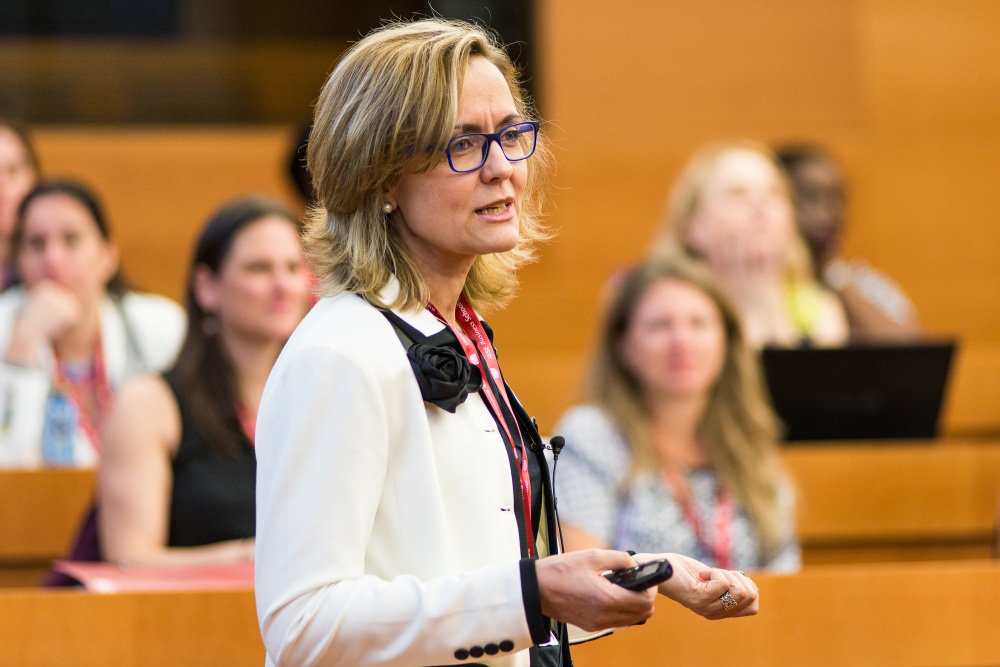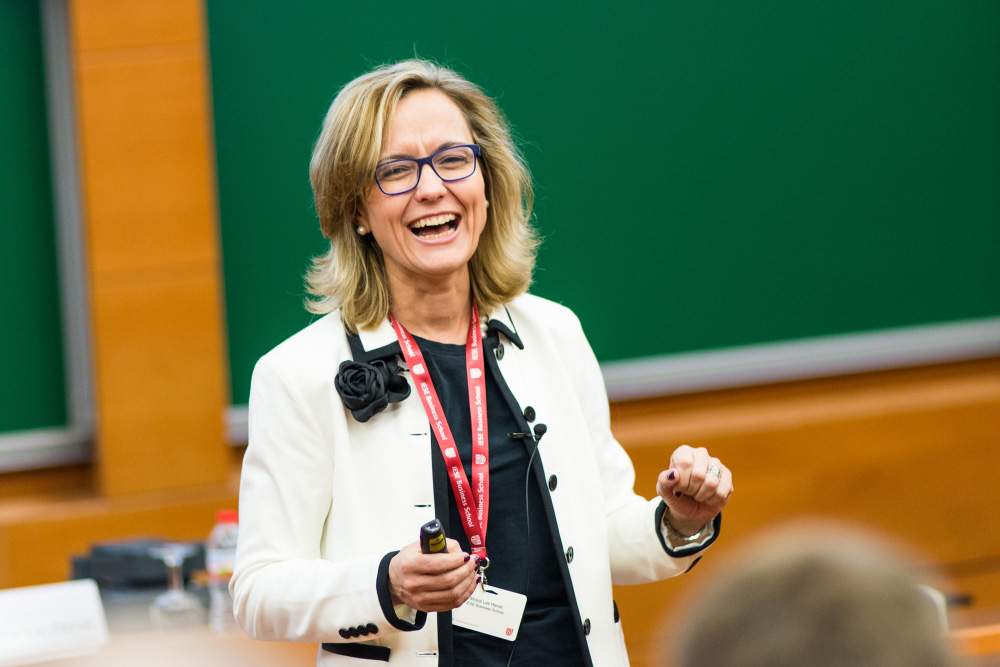Academic Conferences I Organize
Work–Family conferences I Organize and Chair
Honored to facilitate research generation, sharing and advancement in Work-Family.
11th Academic IESE Conference: Work-Family in the Era of Artificial Intelligence. The Importance of Nurturing Relationships
Conference · Barcelona June 30 - July 1, 2025
Over the past few years, we have navigated waves of transformative changes: flexible schedules, remote working, and hybrid models. Just as we began to master these shifts, artificial intelligence emerged, disrupting established norms once again. How do we approach this new landscape? One thing remains constant: the importance of relationships, both at work and in social life – including family.
Hybrid and remote work have brought both opportunities and challenges in maintaining a healthy work-family balance. While employees have experienced greater flexibility, allowing more time for family and personal pursuits, the lack of clear boundaries has led to difficulties in disconnecting from work, increased stress, and potential burnout. At the same time, such remote connections do not allow for face-to-face relationships that tend to be stronger and more personalized.
Artificial intelligence plays a dual role in this scenario. On one hand, AI-driven tools facilitate better time management, automate routine tasks, and enable more efficient remote work. These advancements can support work-family balance by freeing up time for personal and family activities. On the other hand, AI can introduce new challenges by increasing expectations for productivity and availability. The ability of AI to analyze vast amounts of data quickly may lead to higher workloads and pressure to perform, complicating the balance between professional and personal lives.
We also witness a global shift toward more individualistic and aging societies, making relationships more critical than ever. The support of family, friends, and colleagues is vital in managing the demands of this rapidly changing environment. Strong relationships provide the emotional and practical support needed to balance work and family responsibilities effectively. Additionally, engaging in activities we enjoy, and prioritizing leisure is crucial for personal well-being. Pursuing hobbies, spending time with loved ones, and taking breaks to recharge are essential components of a balanced life. These activities not only help reducing stress but also contribute to personal flourishing.
At the International Center for Work and Family, we have been exploring these dynamics for years. Our research underscores the benefits of work-family balance for individuals, organizations, and society. At the upcoming 11th bi-annual International Conference of Work & Family, we aim to foster discussions on best practices for maintaining work-family balance in this new era. By sharing experiences and insights, we can develop strategies that enhance both professional productivity and personal fulfillment.
10th Academic IESE Conference: Rethinking Work-Family 2023
Conference · Barcelona July 5-6, 2023
The increase in new ways of working has brought multiple changes to the workplace such as: flexible workspaces, smart time management and the extended use of information and communication technology. Along with these developments, fundamental changes have surged in the way people integrate their work and home domains. As we shift towards work arrangements that include teams working remotely, in the office, on fixed schedules and on flexible ones, we should also reconsider how work and home domains are integrated in our everyday lives.
In 2020, the global pandemic forced millions of employees to lock down due to mobility restrictions. Consequently, workers with dependents in their homes – ranging from the young to the elderly – had to manage, within one unique workspace, the responsibilities of a full-time job, plus the work of caretaking. Among the demands that people had to manage along with their professional roles were: school follow-up; help with hygiene and chores; virtual class monitoring; and nursing the elderly. These demands led to conflicts due to burn out and stress, while shedding light on the importance of rethinking work-family balance.
As organizations return to offices, and employees adapt to new approaches to remote and hybrid work, the role of work-family integration can also be transformed to respond to this new context. With the increase of remote work and hybrid working models, the elimination of barriers between home and work has led to different work-family balance challenges, especially for employees with kids at home. As we design the future of work, we believe it is also important to rethink the way we integrate the home and work spheres.
At the International Center for Work and Family, we have been talking for years about how work-family balance can provide benefits for people, organizations and society as a whole. For several years, we have conducted multiple studies that examine the potential benefits of flexible work arrangements. The 10th International Conference of Work & Family aims to focus on individual and organizational ways of rethinking work-family balance within the context of new ways of working. As we define new ways of working, we want to encourage new ideas about how we can also shift the way we think about work-family balance, adapting to current realities.
9th International Conference of Work and Family
Social inequality, climate change and poverty around the world have people questioning our understanding of growth and development. We all are increasingly concerned about the way our decisions affect natural resources, impact the environment and foster economic growth. More voices are claiming that our current patterns of consumption, production and disposal might actually decrease the quality of life for future generations. For these reasons, organizations, individuals and society are ever more interested in building a shared vision to work toward a more sustainable way of life.
In 2015, the United Nations established the Sustainable Development Goals (SDGs). The SDGs comprise 17 ambitious goals to be reached by 2030 under the pledge: Leave no one behind. The call to action includes topics such as eliminating hunger, tackling inequality and fighting climate change, collectively addressing social, economic and environmental aspects of sustainable development. With this, leaders should work toward peace and prosperity while ensuring the protection of our planet.
Since then, individuals and society have begun to demand more immediate answers. In 2018, Greta Thunberg, a 16-year-old Swedish girl, became a global phenomenon after beginning a strike to fight for climate change. Her message went viral and resulted in multiple demonstrations all over the world. Society called upon leaders for answers and demanded that organizations work immediately toward a more sustainable world. It seems we need solutions to accelerate the process of achieving the proposed SDG agenda.
Policies that benefit the environment and individuals’ quality of life are part of efforts toward a sustainable society. The SDGs include physical, mental and social well-being as an objective on the road to healthy lives for all. Lately, the number of working adults with problems related to anxiety, quality of sleep, frustration and depression has risen. Addressing mental health is important in itself, but it is also relevant for organizations and society as part of their contribution to sustainable development. Organizations with employees that enjoy good health and high well-being benefit society. Healthy employees are better equipped to achieve sustainable human development. Therefore, we believe a healthy workplace is part of the path to a healthy world.
Through work-family balance, families and business can foster social responsibility, well-being, role modeling and sustainability. The 9th Biennial International Conference of Work & Family focus on individual and organizational capacity to manage work and social aspects of life under a sustainable view. We encourage research and discussion around solutions to make workplaces more sustainable – that is, that they promote employee well-being, family enrichment and environmental responsibility. We are interested in understanding practices, sociocultural aspects and institutional frameworks that motivate work-family balance and foster social, economic and environmental sustainability.
2019 Work and Family: Work family in the pursuit of happiness
Mireia chaired the 8th International Conference of Work and Family “Work Family in the Pursuit of Happiness” The Conference will took place in July 1st and 2nd at IESE, in Barcelona (Spain). We welcomed papers focused on the current and future transformations of work and family and their social and organizational implications, from a wide range of scientific perspectives: management, philosophy, empirical social sciences, law and regulation, and humanistic studies, among others.
The conference aimed to contribute in building a new vision of work and family that places the centrality of the human being at the core of the definition and practice of organizations and societies. It attracted more than 70 academics coming from over 20 countries.
2017 Work and Family” The (new) ideal worker”
Mireia co-chaired the 7th bi-annual International Conference of Work & Family, that focused on the (new) ideal workers, as well as on their needs, desires and new forms of flexibility.
In the seventies, Coser defined the Greedy Institutions as those institutions who asked their members for an “exclusive and undivided loyalty”. These institutions assumed that the “ideal worker” was the one who devoted long hours to their jobs with no family interference. In some sense, this image of “ideal worker” still exists, but empirical evidence seems to suggest that far from being positive for the organizations, having old “ideal workers” may have a negative impact on the 21st Century Organizations. Moreover, recent technological, social and demographic changes have reshaped the way people work and the way families organized themselves. In a situation like that, where more employees ask for a real work-family balance/integration, it was timely and relevant to examine the “new ideal worker”, to understand how companies could adapt to this new situation. We focused on the definition of the (new) ideal worker.
The Conference took place in July 3rd and 4th at IESE Campus in Barcelona, with more than 80 participants from the five continents, representing more than 20 nationalities.
2015 Work and Family “Balance, Technology and Globalization”
The sixth bi-annual International Conference of Work & Family focused on Balance, Technology, and Globalization.
In an age in which information technology has brought the promise of autonomy and control by allowing asynchronous communications; in which work systems have enabled people to work from various times and locations; in which work and non-work boundaries have as a result been blurred; the work and family interface needed to be reconsidered. In this conference, we were specifically interested in papers that focused on new perspectives in work-family that addressed a wide range of topics current problems, and contributed with solutions to those problems. For example, what are the impacts of changes in the global economy? How do global workers cope with work-family issues? How does information technology affect work-family dynamics?
The Conference took place in July 1st and 2nd, 2015, at IESE Campus in Barcelona.

